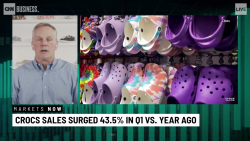The start of the holiday shopping season has been creeping up for years as America’s biggest retailers fight to win customers with early deals in stores and online.
This year marks the earliest start to the season yet: Amazon Prime Day, one of the biggest shopping events of the year, usually takes place in the summer. The pandemic prompted Amazon to delay the event until this week, starting on Tuesday.
Prime Day, which has taken place since 2015, only makes up around 1-2% of Amazon (AMZN)’s annual sales, analysts say. Amazon (AMZN) holds the event each year to build loyalty with Prime subscribers and hook new shoppers to the program.
Retail analysts expect this year’s Prime Day to give Amazon an extra lift in the fourth quarter. That’s because people are more likely to spend more at the end of the year for the holidays than they would in summer months. And while there’s risk that consumers may cut back on spending as job losses grow and more time passes without a stimulus deal in Congress, retail analysts say Amazon is well-positioned.
Prime members skew higher income, which may make these shoppers less susceptible to job losses and a stimulus bill not being passed, analysts say. Prime shoppers may be spending less on travel and other leisure activities than they did before the pandemic. This means they’ll have more to spend on electronics, kitchenware and other items from Amazon.
“If anything, many people are flush with cash and it could drive higher sales this year,” said Brian Yarbrough, analyst at Edward Jones.
Plus, the pandemic has given a boost to ecommerce spending as more people shop online from home. Amazon is benefiting from the trend.
Telsey Advisory Group forecasts Prime Day sales of up to $11 billion for Amazon, a 40% increase from last year’s event, which was held in July. The spike in online shopping as consumers order from home and increased participation from small businesses is expected to help drive higher sales, the firm said.
“Prime Day does have additional importance to Amazon this year,” said Andrew Lipsman, analyst at market research firm eMarketer. “It also likely signs up new Prime members at the exact right time and puts Amazon in an even better position to gain market share in November and December.”
Spreading the holiday shopping season out over a longer period may also help Amazon avoid a crush of orders later on in the season that overwhelms its logistics network and leads to shipping delays.
“I think Prime Day this year may allow Amazon to better manage what will likely be very robust online retail demand this holiday season,” said Mark Mahaney, analyst at RBC Capital Markets.
Online retail sales are expected to grow 18.5% this holiday, the highest growth since 2008, research firm Forrester predicted in a report last month. But retailers “will feel significant pressure on their margins” this holiday season because “e-commerce logistics costs increase retailers’ costs,” Forrester said.
Amazon also faces rising costs, but Amazon is in better position than most retailers to manage them because the company has its own delivery network and is less reliant on outside shipping carriers, said Yarbrough.


























